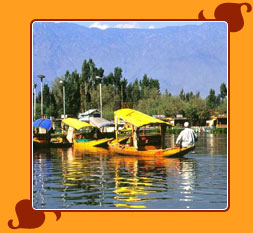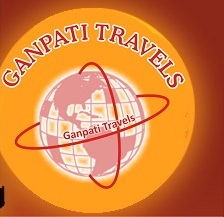Situated on the banks of the Jhelum River, a tributary of
the famous Indus River, the city of Srinagar is a heavenly abode on earth
with numerous lakes and large expanses of green valleys spread throughout.
The Jhelum River runs through the city and the valley, emptying in the Wular
Lake. The city at

Founded
by the King Pravarasena II over 2,000 years ago, Srinagar owes its name to
two Sanskrit words, Sri (meaning profusion and wealth) and Nagar, (meaning a
city). Dating back to the 3rd century BC, the city was formerly a part of
the Mauryan Empire, which once happened to be one of the most important
empires of India.
This region prospered quite well under the rule
of the Kushans in the 1st century AD. During this period, it used to be an
important Buddhist pilgrimage site. In the 6th century, however, it became a
part of the kingdom of Vikramaditya, the ruler of Ujjain. Local Hindu rulers
ruled it until the 14th century, when Muslims rulers invaded and captured
it. With the downfall of the Mughal Empire the fortunes of the area swung
dramatically. In 1814, it went to the Sikhs, when Ranjit Singh got the
better of the Pathans.
However, ultimately the British defeated
Ranjit Singh and in accordance with the treaty of Lahore in 1846, they
appointed Gulab Singh as the autonomous ruler of Kashmir. Later, Hari Singh,
the great grandson of Gulab Singh, united this huge state into India in
1948, when the Pathan intruders from Pakistan tried to capture this state.
Best Seasons, Climate, and ClothingThe
climatic conditions in Srinagar are mostly alpine. Summers (April-June) are
gentle and soothing while the winters (November-February) are icy cold.
During December-February it is blessed with heavy snowfall. Srinagar is best
visited during summers between the months of April and June. You will need
to carry heavy woolens while traveling to Srinagar.
Tourist
AttractionSrinagar, the summer capital of the Indian state of Jammu
and Kashmir, is acclaimed to be one of the loveliest places in India, in
terms of natural splendor. Set in the picturesque Kashmir valley at an
altitude of 1730 meters, Srinagar is a tourist’s paradise and one of
the most beautiful hill stations in India. The major tourist attractions in
Srinagar include its beautiful rivers and lakes, with rows of charming
houseboats floating on them, magnificent blossoming gardens, and lush green
woods.
Dal Lake:The most important tourist
attraction in Srinagar, the Dal Lake has, within its periphery, four
enormous water bodies, Lokut Dal, Bod Dal, Gagribal and Nagin. The lake is
not a flat, continuous mass of water, but an intricate labyrinth of
waterways, that constitute a spectacular sight and an amazing locale to
explore.
Wular Lake:The largest freshwater
lake in India, Wular Lake lies about 32 kms to the northwest of Srinagar
city. The lake is surrounded by high mountains on the north and north-east
of the valley, which augment the scenic charm of the region. .
Shankaracharya
Temple: Located on top of a hill known as ‘Takht-e-Suleiman’,
this ancient temple stands at an altitude of about 1100 feet above the
surface level of main Srinagar city. The sacred temple can be visited only
through a trek to the top of the hills.
Khanqah-e-Molla:
Also called Shah-e-Hamdan, this shrine is believed to contain "the
secret of Allah”. One of the oldest Muslim shrines located on the banks
of the river Jhelum in Srinagar city, the Khanqah-e-Molla exhibits exemplary
specimen of wood architecture.
How to Reach Located
at the foot of the mighty Himalayas, the magical city of Srinagar lures
tourists from far and wide with its stunning locales, magnificent lakes,
tumbling rivers and lush green meadows. This treasure trove of beauty is
famous for its picturesque lakes -- Dal, Nagin and Anchal, and the
spectacular houseboats floating on them. Before planning any tour to
Srinagar, you must be well equipped with all relevant information about
transportation and access in Srinagar.
By Air:
The domestic airport in Srinagar is located at a distance of 14 kms from the
city and operates regular flights to major Indian cities like Delhi and
Mumbai. Several private and state airlines operate flights for reaching
Srinagar from these cities. Take a taxi from Srinagar airport to reach the
city centre, or you may rent a car upon arrival.
By
Rail: The nearest railway station from Srinagar is at Jammu Tawi, about
293 kms from the city. Jammu station has excellent rail connections with
almost all major cities of India. Once you reach Jammu station, board a bus
or hire a car / taxi to proceed on a 12-hr journey to Srinagar
By
Road: An extensive network of roads and highways connects Srinagar with
the major cities in Jammu and Kashmir and northern India. Some of these
cities are Chandigarh (630 km), Delhi (876 km), Jammu (298 km), Leh, Kargil,
Gulmarg, Sonamarg, and Pahalgam. The National Highway 1A connects Srinagar
with the rest of the country. Private coaches and taxis can be hired from
Jammu Tawi for transportation and access to Srinagar. The Jammu-Srinagar
road runs through grand mountain passes, with lovely fields extending onto
the sides and lined with soaring trees. The journey takes almost 12 hours
and makes for a pleasant experience.
Local Transport:
You have several options at hand for transportation within Srinagar. Move
around Srinagar in state transport buses, hire taxis or auto rickshaws, or
simply pedal your way down the flat lands of Srinagar. Nevertheless, the
most unique way to explore the picturesque locales of this charming city is
by traveling in any of the spectacular Shikaras (boats), floating along
Srinagar’s lakes.






